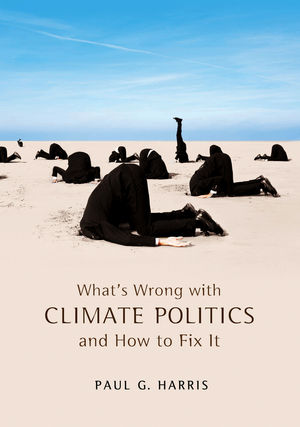 Paul G. Harris prescribes several remedies for the failed politics of climate change, including a new kind of climate diplomacy with people at its centre, national policies that put the common but differentiated responsibilities of individuals alongside those of nations, and a campaign for simultaneously enhancing human wellbeing and environmental sustainability. Ultimately, Harris’s book offers some very sensible reasons for reducing consumption amongst the most wealthy, but the book repeats the same mistakes of the majority of texts arguing for changes in patterns of consumption, writes Christopher Shaw.
Paul G. Harris prescribes several remedies for the failed politics of climate change, including a new kind of climate diplomacy with people at its centre, national policies that put the common but differentiated responsibilities of individuals alongside those of nations, and a campaign for simultaneously enhancing human wellbeing and environmental sustainability. Ultimately, Harris’s book offers some very sensible reasons for reducing consumption amongst the most wealthy, but the book repeats the same mistakes of the majority of texts arguing for changes in patterns of consumption, writes Christopher Shaw.
 What’s Wrong with Climate Politics and How to Fix It. Paul Harris. Polity. June 2013.
What’s Wrong with Climate Politics and How to Fix It. Paul Harris. Polity. June 2013.
In this analysis of our dysfunctional climate politics, Paul Harris identifies three barriers to reducing greenhouse gas emissions: self interest of nation states in general, the self interest of US and China in particular, and the self interested behaviour of individuals. For a student or interested citizen wishing to delve deeper into some of the issues behind the current climate policy impasse, this well researched book offers an accessible and engaging read. However, the book does not quite live up to the promise of telling us how to fix it. This is because Harris draws heavily upon a pre-existing stock of ideas which have already failed. In presenting these ideas as the limit of the possible, Harris’ book risks doing as much to entrench the problem as solve it.
The problem of climate politics, according to Harris, is that atmospheric concentrations of greenhouse gases are continuing to rise, twenty five years after climate change first appeared on the political agenda. The cause of this problem is diagnosed as self interest – the self interest of nation states in general, the self interest of the US and China in particular, and the self-interest of individuals, chasing happiness through consumption. The solution offered by Harris is a people-centred politics. A large part of the book is concerned with running through the numbers of rising emissions – where the emissions are coming from, and the historical trends in the distribution of greenhouse gas emissions, from developed nations in the 20th century to the rising powers of China and India in the 21st century. In this review I will discuss what Harris sees as the problem of excessive consumption (Chapter 4), and the remedy for this (Chapter 7). In doing so I draw on the relationship between the state and the individual, which Harris returns to throughout the book.
Chapter 4 details the evidence to show that consumerism can never provide truly lasting happiness; indeed, is the root of much unhappiness. Despite this, the virus of affluenza is spreading, and threatens climatic doom for humanity. It is not always clear how much agency, and hence blame, Harris lays at the foot of the individual for this malaise. At one point Harris argues that individuals should be at the centre of climate policy, in part because it is individuals who cause climate change. This is pretty much the same as arguing it is ordinary foot soldiers who cause war. Elsewhere Hasrris suggests a more structural reason for the failure of climate politics, and argues that the value system underpinning modern capitalism must be replaced with a less materialistic culture. To do this, individuals must accept sustainable levels of consumption.
In Chapter 7 Harris outlines the ideas which might guide humanity to this promised land. Not unreasonably he contends the rich must consume less, so the poor can consume more. Harris suggests in order to bring about this change in attitudes to consumption it will be necessary to encourage particular sections of society (for example the young) that true happiness cannot be found in constant consumption. To do so, messages ought not identify such changes as sacrifices, but should instead focus on highlighting the benefits of these changes. Governments should no longer encourage consumption, and should instead treat excessive consumption as socially taboo. The people have a role in this change, ‘because the choices and behaviours of individuals can determine how the distribution of power and resources shape the world around us’. This is all standard fare, which has dominated left of centre liberal discourses on climate change for over a decade.
One cannot fault Harris’s definition of excessive consumption as a hollow and futile means of achieving fulfilment, nor its role in driving atmospheric concentrations skyward at a record speed. But this is old news. Perhaps it is because Harris frames climate change as a tragedy rather than a crime that he is willing to distribute the blame. However, if he had understood the harm being caused by climate change as a crime, he may have been moved to ask much more difficult questions, such as, what sort of climate politics is possible in societies where the state draws on a wide range of surveillance techniques to monitor, infiltrate and undermine the activities of civil organisations which seek to promote the very lifestyle changes Harris sees as the solution? Harris makes clear the solutions he offers are only partial, but given the well established literature on the role of the media in shaping people’s understanding of climate change, his failure to include the media as a part of the problem is particularly difficult to explain. If Harris is concerned to see an end to unsustainable consumption, the corporate media should be firmly in his sights. In fact, it may well be that we have to accept that climate politics isn’t broken, that the intention all along is to overcome any crisis of legitimacy, by simply giving the appearance of doing something while waiting for a geo-engineering fix which leaves the neo-liberal project intact, whilst brushing the emissions under the carpet.
Ultimately, Harris’s book offers some very sensible reasons for reducing consumption amongst the most wealthy. Unfortunately, in making the assumption that simply proposing good ideas is enough for change to happen, the book repeats the same mistakes of the majority of texts arguing for changes in patterns of consumption. The dearth of ideas is not our problem. The combined efforts of state, corporate and media actors in promoting unfulfilling and unsustainable consumption is the problem of climate politics, and it is misguided to think this power will simply dissolve away in the presence of some good ideas.
—————————————————————
Christopher Shaw is a Knowledge Exchange Fellow at the Environmental Change Institute, University of Oxford. He holds a DPhil from the School of Law, Politics and Sociology, University of Sussex. His thesis was entitled ‘Choosing a Dangerous Limit for Climate Change; How the Decision Making Process is Constructed in Public Discourses’ (Oct 2006-April 2011). He is currently working on a book due for publication by Routledge in March 2015, examining public representations of dangerous climate change and the implications of these representations for building climate citizenship. Read more reviews by Chris.








Haven’t read the book but 100% agree with Chris Shaw’s concern:
“… the book repeats the same mistakes of the majority of texts arguing for changes in patterns of consumption. The dearth of ideas is not our problem.”
I’m widely read on enthusiastic “climate solutions” and there sure are a ton of ’em. But after a quarter-century of increasingly informed and alarming climate discussion, no solution has yet been put into effect that has stopped — or even slowed — increased global warming. Sounds like book author Paul Harris is at least 2 steps removed from generating insightful, useful, PROACTIVE solutions.
HOWEVER, Chris’ own statement (below) indicates that he himself may still be a step removed from the root of the problem, too:
“The combined efforts of state, corporate and media actors in promoting unfulfilling and unsustainable consumption is the problem of climate politics.”
I DO AGREE that state, corp + media’s relentless promotion of consumption and growth-based economics — and the requisite fossil-fuel infrastructure that underpins it all — is unconscionable and unsustainable. But I think it’s IMPOSSIBLE to expect those 3 agents (well, at least corp + media) to suddenly check their moral compass, ignore their financial motivating forces, and guide all us shoppers into some sustainable promised land. NOT. GONNA. HAPPEN.
Consider this common parallel debate about hot dogs. Most people in America love ’em. We’ve aggrandized ’em into a cultural icon. Nothin’ more American, right? But if you want to convince people to stop eating hot dogs, TELLING THEM TO STOP LIKING THEM isn’t going to change consumer taste.
TELLING people what they SHOULD NOT DO never works at societal scale, let alone globally. Bacon simply tastes too good, and for better or worse, that’s as far as most people think!
Instead, the only reasonable approach is to SHOW THEM INSIDE the notorious hot dog factory. In fact, show them the FULL SUITE OF NEGATIVE EXTERNALIZED COSTS associated with the meat industry. Most already know that their hot dog purchase includes famously nauseating conditions for animals. Many understand about the unhealthy hormones and antibiotics, and the increase of heart disease from a meat-centric diet. A growing few even grasp the tragic waste of food calories diverted from human food crops like corn into industrial feedlots. But a COMPLETE UNDERSTANDING OF EXTERNALIZED COSTS includes the fact that meat accounts for just as much global warming and climate change as all transportation combined!
Even faced with all the info, some will STILL choose to eat hot dogs. Let it go … that’s just battle damage.
What can WIN THE WAR is a large enough percentage of the population SO TURNED OFF BY A FULL ACCOUNTING of the life-cycle cost of meat that they can’t stomach paying for it all. A growing number of people will GRADUALLY make the ENLIGHTENED CHOICE not to eat meat.
Now step that analogy up to the scale of global warming and catastrophic climate change. It’s common knowledge that one of the root causes is conspicuous consumption. But TELLING PEOPLE NOT TO over-consume will never work. Most already have a dull sense that “you can’t buy happiness”. Even so, people STILL LOVE SHOPPING — and that’s as far as most people think!
Anyway, I think it’s a losing argument: civilization has been moving TOWARDS the holy ground of widespread disposable income and conspicuous consumption for centuries. And while not everyone is rich today, and not everyone can buy everything they need, it is still undeniable that for all its faults, CAPITALISM + DEMOCRACY is a powerful combination and CONSUMPTION is an almost DNA-level evolutionary drive.
So the way to influence that lifestyle is to EXPOSE THE FULL SUITE OF NEGATIVE EXTERNALIZED COSTS. Every pair of designer jeans, every bottle of hand soap in a pump bottle, every airline flight, every Kobe Steak or pan-seared Chilean Sea Bass has massive external costs that most people don’t know or think about. Sometimes those costs include poor working conditions, sometimes as unsustainable resourcing (mining, fracking, deforestation), but ALMOST ALWAYS as a carbon footprint, from sourcing, processing, manufacturing, packaging, transportation, sales … all the way to recycling or waste streams.
A solid global public education on this issue won’t change everyone into a green consumer, but it MIGHT CHANGE ENOUGH. Which in turn changes the “demand” half of the “supply + demand” mechanism in FREE MARKET ECONOMICS. And it would inform POLITICIANS of the shift in social viewpoint which will eventually SWING POLITICAL POSITIONING (at least to the extent that our representatives still represent constituents). Which in turn would slide the focus of the MEDIA to cover the latest trend … sustainable societies.